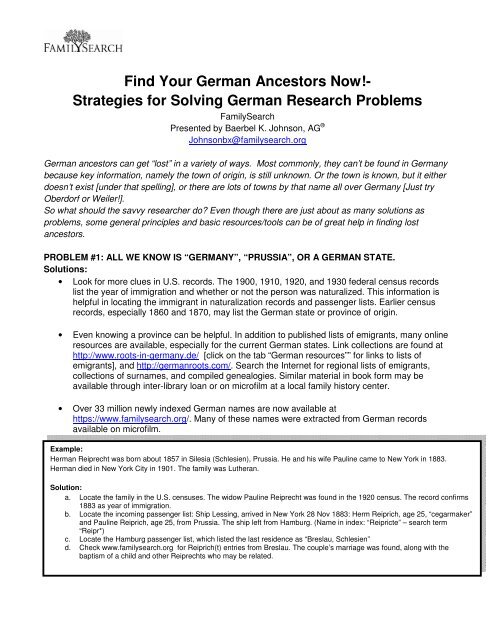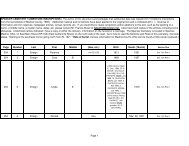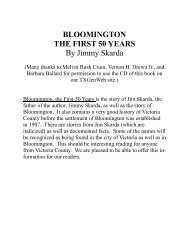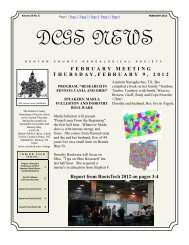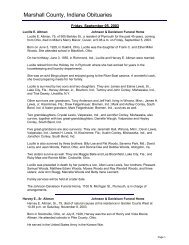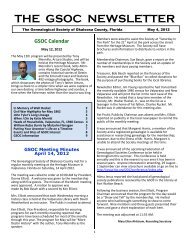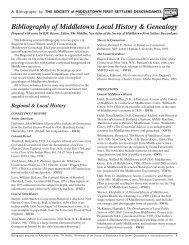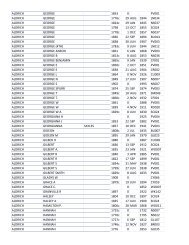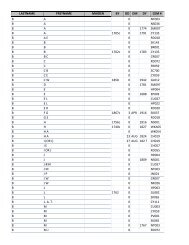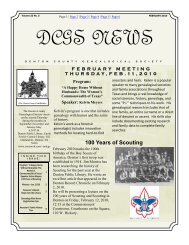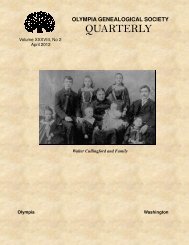Getting to the Roots of Your Family - RootsWeb - Ancestry.com
Getting to the Roots of Your Family - RootsWeb - Ancestry.com
Getting to the Roots of Your Family - RootsWeb - Ancestry.com
You also want an ePaper? Increase the reach of your titles
YUMPU automatically turns print PDFs into web optimized ePapers that Google loves.
Find <strong>Your</strong> German Ances<strong>to</strong>rs Now!-<br />
Strategies for Solving German Research Problems<br />
<strong>Family</strong>Search<br />
Presented by Baerbel K. Johnson, AG ®<br />
Johnsonbx@familysearch.org<br />
German ances<strong>to</strong>rs can get “lost” in a variety <strong>of</strong> ways. Most <strong>com</strong>monly, <strong>the</strong>y can’t be found in Germany<br />
because key information, namely <strong>the</strong> <strong>to</strong>wn <strong>of</strong> origin, is still unknown. Or <strong>the</strong> <strong>to</strong>wn is known, but it ei<strong>the</strong>r<br />
doesn’t exist [under that spelling], or <strong>the</strong>re are lots <strong>of</strong> <strong>to</strong>wns by that name all over Germany [Just try<br />
Oberdorf or Weiler!].<br />
So what should <strong>the</strong> savvy researcher do? Even though <strong>the</strong>re are just about as many solutions as<br />
problems, some general principles and basic resources/<strong>to</strong>ols can be <strong>of</strong> great help in finding lost<br />
ances<strong>to</strong>rs.<br />
PROBLEM #1: ALL WE KNOW IS “GERMANY”, “PRUSSIA”, OR A GERMAN STATE.<br />
Solutions:<br />
• Look for more clues in U.S. records. The 1900, 1910, 1920, and 1930 federal census records<br />
list <strong>the</strong> year <strong>of</strong> immigration and whe<strong>the</strong>r or not <strong>the</strong> person was naturalized. This information is<br />
helpful in locating <strong>the</strong> immigrant in naturalization records and passenger lists. Earlier census<br />
records, especially 1860 and 1870, may list <strong>the</strong> German state or province <strong>of</strong> origin.<br />
• Even knowing a province can be helpful. In addition <strong>to</strong> published lists <strong>of</strong> emigrants, many online<br />
resources are available, especially for <strong>the</strong> current German states. Link collections are found at<br />
http://www.roots-in-germany.de/ [click on <strong>the</strong> tab “German resources”” for links <strong>to</strong> lists <strong>of</strong><br />
emigrants], and http://germanroots.<strong>com</strong>/. Search <strong>the</strong> Internet for regional lists <strong>of</strong> emigrants,<br />
collections <strong>of</strong> surnames, and <strong>com</strong>piled genealogies. Similar material in book form may be<br />
available through inter-library loan or on micr<strong>of</strong>ilm at a local family his<strong>to</strong>ry center.<br />
• Over 33 million newly indexed German names are now available at<br />
https://www.familysearch.org/. Many <strong>of</strong> <strong>the</strong>se names were extracted from German records<br />
available on micr<strong>of</strong>ilm.<br />
Example:<br />
Herman Reiprecht was born about 1857 in Silesia (Schlesien), Prussia. He and his wife Pauline came <strong>to</strong> New York in 1883.<br />
Herman died in New York City in 1901. The family was Lu<strong>the</strong>ran.<br />
Solution:<br />
a. Locate <strong>the</strong> family in <strong>the</strong> U.S. censuses. The widow Pauline Reiprecht was found in <strong>the</strong> 1920 census. The record confirms<br />
1883 as year <strong>of</strong> immigration.<br />
b. Locate <strong>the</strong> in<strong>com</strong>ing passenger list: Ship Lessing, arrived in New York 28 Nov 1883: Herm Reiprich, age 25, “cegarmaker”<br />
and Pauline Reiprich, age 25, from Prussia. The ship left from Hamburg. (Name in index: “Reipricte” – search term<br />
“Reipr*)<br />
c. Locate <strong>the</strong> Hamburg passenger list, which listed <strong>the</strong> last residence as “Breslau, Schlesien”<br />
d. Check www.familysearch.org for Reiprich(t) entries from Breslau. The couple’s marriage was found, along with <strong>the</strong><br />
baptism <strong>of</strong> a child and o<strong>the</strong>r Reiprechts who may be related.


